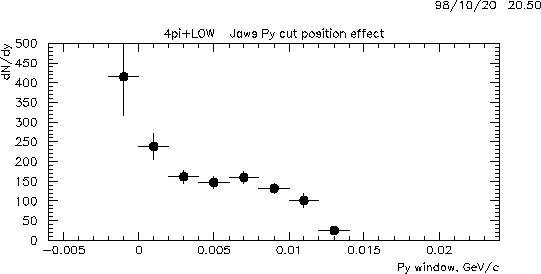



Next: Determination of the trigger
Up: Acceptance correction
Previous: Imperfections of the acceptance
Contents
Kopytine's homepage
Due to the crucial role played by the single-channel Cherenkov devices, the
charged track multiplicity has to be kept low.
In preparation for the  beam, the need of limiting the spectrometer's
acceptance in the low
beam, the need of limiting the spectrometer's
acceptance in the low  setting was realized.
The problem was solved by installing a tungsten alloy
(90% W, 6% Ni, 4% Cu) collimator (``jaws'')
in the magnetic channel of the spectrometer, between D1 and Q1
(see Fig. 3.1).
Orientation of the collimator corresponds to the focusing setting and
is horizontal in the singles data.
In order to cut off the tails of the particle distribution where the particles
momenta might be affected by interaction with the collimator, a cut
on the vertical component of momentum
setting was realized.
The problem was solved by installing a tungsten alloy
(90% W, 6% Ni, 4% Cu) collimator (``jaws'')
in the magnetic channel of the spectrometer, between D1 and Q1
(see Fig. 3.1).
Orientation of the collimator corresponds to the focusing setting and
is horizontal in the singles data.
In order to cut off the tails of the particle distribution where the particles
momenta might be affected by interaction with the collimator, a cut
on the vertical component of momentum  has been applied.
The TURTLE[40]-based Monte Carlo simulation available
during my work on the singles
analysis used to deviate from the experimental data in its prediction
of the peak position in
has been applied.
The TURTLE[40]-based Monte Carlo simulation available
during my work on the singles
analysis used to deviate from the experimental data in its prediction
of the peak position in  , shifting it in the positive direction
by
, shifting it in the positive direction
by  2.5 MeV/c.
I studied dependence of the acceptance corrected
2.5 MeV/c.
I studied dependence of the acceptance corrected  of various
particles on the position of a narrow
of various
particles on the position of a narrow  window, in which the samples
were collected.
The sliding window cut study
showed that, as the window slid towards the negative
window, in which the samples
were collected.
The sliding window cut study
showed that, as the window slid towards the negative  , the
, the  would increase due to the ``emptiness'' of MC acceptance, not balanced out
by the data.
For the positive
would increase due to the ``emptiness'' of MC acceptance, not balanced out
by the data.
For the positive  , an abnormal decrease would be observed.
In between these two regimes, a narrow zone of relative independence
of
, an abnormal decrease would be observed.
In between these two regimes, a narrow zone of relative independence
of  on the
on the  cut position would be found.
cut position would be found.
Figure:
Understanding the collimator-related uncertainty in the
acceptance-corrected pion  .
The horizontal bars show the
extent of the fiducial
.
The horizontal bars show the
extent of the fiducial  window used. In this plot, other corrections
were fixed at the values they had when the study was undertaken.
window used. In this plot, other corrections
were fixed at the values they had when the study was undertaken.
 |
Such a behaviour (see Fig. 4.1)
is characteristic of situations with a misplaced acceptance.
The remedy is to avoid any of the edges, by limiting the acceptance to
the middle zone.
The  ranges so chosen are listed in Tables 4.7
and 4.9.
ranges so chosen are listed in Tables 4.7
and 4.9.




Next: Determination of the trigger
Up: Acceptance correction
Previous: Imperfections of the acceptance
Contents
Mikhail Kopytine
2001-08-09

